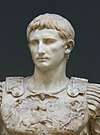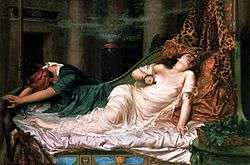Cultural depictions of Augustus
Caesar Augustus (63 BC–AD 14), also known as Octavian, was the first and among the most important of the Roman Emperors.
Augustus' most visible impact on everyday culture is the eighth month of the year, which was renamed in Augustus' honor in 8 BC because several of the most significant events in his rise to power, culminating in the fall of Alexandria, occurred during this month.[1]
Artwork
Augustus was one of the most widely depicted individuals in ancient times,[2] appearing in coins, sculptures, cameos, plaques, and other media. His dominant portrait type is that of the serene, ageless Augustus of Prima Porta, introduced in 27 BCE.[3] At its best, in Roland R. R. Smith's view, this "type achieves a sort [of] visual paradox that might be described as mature, ageless, and authoritative youthfulness".[4] D. Boschung[5] identified four other portrait types (the Actium or Alcúdia type, the Béziers-Spoleto type, the Forbes or MA 1280 type, and the Lucus Feroniae type),[6] although Smith considers the Béziers-Spoleto type to be a variant of the Alcúdia type and the Lucus Feroniae type to be a category of dubious validity.[6] The Alcúdia portrait type is thought to have been developed around 40 BCE to coincide with the adoption of the patronymic title Divi Filius; Smith describes it as "a youthful portrait with thick hair and probably some expression of vigour and energy".[4] Different scholars have argued whether the Forbes type, "with distinctive short forehead hair," preceded or followed the Prima Porta type.[7]
 Portrait of the dominant ('Prima Porta') type[3]
Portrait of the dominant ('Prima Porta') type[3]
 Portrait of the 'Forbes' type (Louvre MA 1280)[9]
Portrait of the 'Forbes' type (Louvre MA 1280)[9]_20.jpg) Bust of Augustus in Spoleto, one of the two examples of the 'Béziers-Spoleto' portrait type[6]
Bust of Augustus in Spoleto, one of the two examples of the 'Béziers-Spoleto' portrait type[6] Augustus in the Villa Chiragan. This portrait is based on the Alcúdia and Prima Porta types but shows greater age[4]
Augustus in the Villa Chiragan. This portrait is based on the Alcúdia and Prima Porta types but shows greater age[4]- Augustus, then named Caesar Divi Filius, in 36 BCE; his beard symbolizes that he is in mourning[10]
 Egyptianized statue of Augustus. Roman Period. State Museum of Egyptian Art, Munich
Egyptianized statue of Augustus. Roman Period. State Museum of Egyptian Art, Munich
Literature
- Allan Massie's 1986 novel Augustus purported to be an autobiography of the Roman emperor.
- Augustus was a central character in the DC Comics graphic novel The Sandman installment #30, titled "August".
- A bust of Augustus has an important role in The Mystery of the Fiery Eye (1967) of the Three Investigators series.
- Augustus is an example in an important speech in Kurt Vonnegut's 1965 book God Bless You, Mr. Rosewater.
- John Edward Williams wrote a novel titled Augustus which won the 1973 National Book Award.
- The 1934 historical fiction novel I, Claudius by Robert Graves has Augustus play a central role. Augustus is depicted as being a well-meaning ruler, who genuinely desires to retire from his status as Emperor and restore the Republic, but is driven by Livia into not doing so. Towards the end of Augustus life Augustus recognizes the sins of Livia and attempts to stave her off and declare Postumus Agrippa his heir, leading Livia to poison Augustus. Augustus deals with numerous heartbreaks, the greatest of which is his banishment of his daughter Julia for her numerous adulteries.
- Augustus (as Octavian) plays a central role in Michael Livingston's 2015 historical fantasy novel The Shards of Heaven.[11][12]
Theater
- Augustus is a notable supporting character in William Shakespeare's plays Julius Caesar and Antony and Cleopatra, in which he is called Octavius and Caesar respectively.
Film
Portrayals of Octavian/Augustus in film:
- Cleopatra (1917) portrayed by Henri De Vries.
- Cleopatra (1934) portrayed by Ian Keith.
- The Boys from Syracuse (1940) portrayed by Tom Dugan.
- Julius Caesar (1950) portrayed by Bob Holt.
- Julius Caesar (1953) portrayed by Douglass Watson.
- Cleopatra (1963) portrayed by Roddy McDowall.
- Julius Caesar (1970) portrayed by Richard Chamberlain.
- Cleopatra (1999) portrayed by Rupert Graves.
Television
- Augustus was played by Roland Culver in the 1968 BBC miniseries The Caesars.
- In the 1969 Play of the Month production of William Shakespeare's Julius Caesar, Augustus (as Octavius) is portrayed by John Alderton.
- Augustus was portrayed in the celebrated BBC 1976 dramatization of Robert Graves' novel I, Claudius by Brian Blessed. It is implied in the dramatization that he was poisoned to death by Livia.
- Augustus was portrayed in the movie Imperium: Augustus (part of the Imperium movie series) by Peter O'Toole as an old man and Benjamin Sadler as a young man. (2003)
- In the HBO/BBC/RAI television series Rome (2005), Octavian is portrayed as a young man by Max Pirkis and as an adult by Simon Woods.[13] In the first season of the series Octavian is a well-read supporter of Caesar. Octavian becomes the pupil of Titus Pullo and also advises Pullo several times. Octavian shifts to more overtly ambitious and Machiavellian in the second season as his growing hatred with Antony becomes apparent. In contrast to more benign portrayals of Octavian this portrayal depicts him as fairly cruel with only brief moments of humanity shown in his relationship to his sister.
- Augustus was portrayed by Santiago Cabrera in an ABC miniseries called Empire (2005), which took place after the assassination of Caesar.
Video games
- In Civilization IV, each game concludes with various statistics and a timeline, as well as a scale comparing the player to various historical figures. Augustus Caesar is at the top of the scale. He was also added in the expansion Civilization IV: Warlords as a Roman leader, accompanying Julius Caesar from the original game.
- Also made his way into Civilization V, once again leading the Roman Empire. His special ability is "The Glory of Rome", which grants production bonuses for city improvements.
- Was also a Main Character in the PS2 game, Shadow of Rome
- Augustus is one of the playable factions in Total War: Rome II's Imperator Augustus Campaign pack, which depicts the Second Triumvirate War between Octavian, Mark Antony and Lepidus during the last years of the Roman Republic.This DLC was released simultaneously with Total War: Rome II: Emperor Edition.
Notes
- ↑ Macrobius, Saturnalia 1.12.35.
- ↑ Goldsworthy (2014), p. 256.
- 1 2 Smith (1996), p. 38.
- 1 2 3 4 Smith (1996), p. 46.
- ↑ D. Boschung (1993). Die Bildnisse des Augustus: das römische Herrscherbild. Berlin: Gebr. Mann. ISBN 3786116954.
- 1 2 3 Smith (1996), p. 39.
- ↑ Smith (1996), pp. 38-39.
- ↑ Smith (1996), p. 40.
- ↑ Smith (1996), p. 37.
- ↑ Goldsworthy (2014).
- ↑ "The Shards of Heaven by Michael Livingston". Publishers Weekly. Retrieved January 29, 2016.
- ↑ "Review: The Shards of Heaven by Michael Livingston". Kirkus Reviews. September 3, 2015. Retrieved January 29, 2016.
- ↑ "Augustus Caesar (Character) from Rome (2005)," The Internet Movie Database.
References
- Goldsworthy, Adrian (2014). Augustus: First Emperor of Rome. ISBN 9780300178722.
- Smith, Roland R. R. (1996). "Typology and diversity in the portraits of Augustus". Journal of Roman Archaeology. 9: 30–47.
